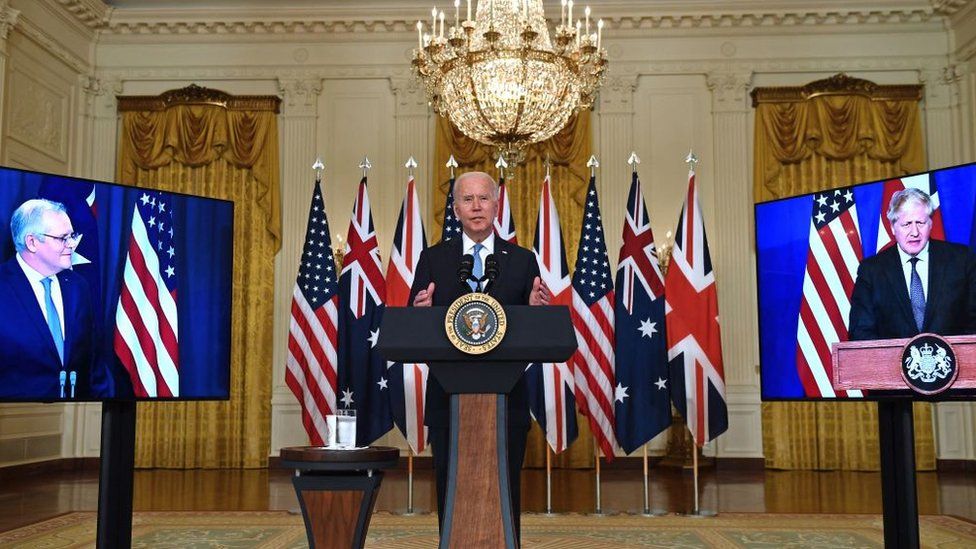Implications of the AUKUS Agreement on International Relationships
AUKUS is a trilateral strategic defence agreement between Australia, the United Kingdom, and the United States that was announced on September 15, 2021. The agreement aims to strengthen security within the Indo-Pacific region, and though no country was specifically named, it is implied that the goals are intended to counter China’s influence within the region and the South China Sea. The pact involves information and resource sharing to improve cyber capabilities, artificial intelligence, and technology between the three countries. Under the pact, the US and the UK will help Australia to acquire nuclear-powered submarines.
Strategic Implications
Since the territorial disputes began in May of 2021, China has been increasing its control and presence within the South China Sea, a strategically important location that would allow China to access crucial resources as well as control trade in the prosperous region. It is in the West’s interests to combat China’s influence within the region not only to maintain international order and protect the territory that belongs to other sovereign states, but also to combat the rise of China as a global hegemon and its ability to spread its authoritarian influence. Through the sharing of resources, technology, and information, the countries within AUKUS would be able to strengthen their military presence and better maintain control over the Indo-Pacific region, challenging China’s influence. However, none of the countries have publicly announced this as their intention.
Impact on other international relationships
The creation of the AUKUS pact has increased tensions between many countries. China, for instance, has reacted to this pact with hostile aggression. China’s foreign affairs department spokesperson Zhao Lijian stated, “The nuclear submarine cooperation between the US, the UK and Australia has seriously undermined regional peace and stability, intensified the arms race and undermined international non-proliferation efforts.” Moreover, the Chinese Communist Party (CCP)-owned newspaper, the Global Times, has denounced Australia as an adversary of China. It has also implied that Australia could be targeted by China if it supported the US in military assertion, stating that China would “certainly punish it with no mercy.”
Furthermore, the AUKUS agreement resulted in Australia abandoning its deal with France to purchase $90 billion worth of nuclear submarines. This has significantly increased tensions between the two countries, with France considering this incident a “stab in the back”, and their Minister of Foreign Affairs, Jean-Yves Le Drian, stating that the cancellation “constitute[d] unacceptable behaviour between allies and partners.” On September 17, France recalled its ambassadors from Australia and the US, something that has never occurred before despite tensions in the past. Additionally, Arnaud Danjean, a French Member of the European Parliament (MEP), said that “Australians can expect more than a delay in concluding the Free Trade Agreement with the EU”. Though the French ambassador has returned to the United States, the damage to the relationships between Australia and France, as well as the US and France, are likely to remain for years to come. This can be reflected in the political climate within France, where Opposition politicians are demanding that France leave the North Atlantic Treaty Organization (NATO), as well as a parliamentary inquiry.
Alongside increasing tensions with France, AUKUS has also sparked concerns within many neighbouring countries within the Indo-Pacific region due to the escalation of conflict the pact could bring. Indonesia, in particular, would be caught in the crossfire and receive significant damages if conflict were to increase. This has also exposed divisions within the Association of Southeast Asian Nations (ASEAN), where the member states are averse to being put in a position where they are expected to choose between the US and China.
Within Canada, this deal has been the subject of contention during the 2021 federal election. Conservative politicians criticized Prime Minister Justin Trudeau over Canada’s exclusion from the pact, and the Leader of the Official Opposition, Erin O’Toole, has stated that he would seek to join the alliance if elected.
Nuclear Proliferation Concerns
Concerns have been raised that the nuclear submarines Australia would obtain through the AUKUS pact would lead to the delegitimization of the Nuclear Non-Proliferation Treaty (NPT). The NPT aims to prevent the proliferation of nuclear weapons and requires non-nuclear-weapon states to declare all their nuclear material, verifying that none of this material is used to build nuclear weapons. However, the enforcement mechanism relies on the willingness of the international community to enforce the rules and hold states accountable, as there are no automatic consequences for non-compliance (except a referral to the UN Security Council, which is under no obligation to act). Therefore, a large extent of the NPT’s power is upheld through the perceived legitimacy of its member states.
While Australia receiving nuclear submarines does not breach the terms of the NPT, it will have to become the first non-nuclear-weapon state to exercise a loophole that allows it to remove nuclear material from the inspection system of the International Atomic Energy Agency (IAEA). While it is unlikely that Australia will have perverse incentives regarding its nuclear material, concerns have been raised that this would set a precedent that would allow would-be proliferators to use naval reactor programs as cover for the development of nuclear weapons.
